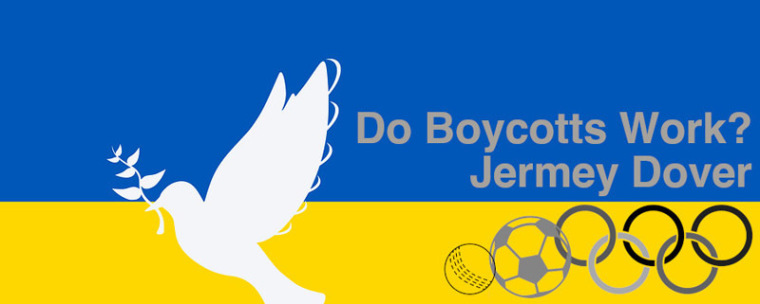
See if you can correctly answer these questions:
Why did countries boycott the 1980 Olympics?
What was the official and unofficial reason countries boycotted the 1984 Olympics?
(Answers in the article)
Sport and politics are interwoven. Like fabrics mixed together, sport is a garment that is deeply woven with money, power and politics. That is the way it has always been from the ancient Olympics till our sport today.
Some take a naive approach of thinking sport is pure and should have no part in politics. They forget that power and influence are as a part of sport as one team claiming victory over another.
Others push the other way and see sport simply as a vehicle to push their own power agenda. Like an advertising campaign selling a brand’s virtues of success and superiority.
The reality lies in the middle. Sport is shaped by our culture and our culture has endless variables of influence. These include power, money and politics.
It is no wonder that sport is linked to world troubles and events. Such as, the recent boycott of Russian athletes because of the Russian invasion of Ukraine. When we see world events that we think are incongruent to our values, then sport often becomes a tool to voice our displeasure. Cue the sporting boycott.
But do Boycotts ReallyWork?
If you can remember back to the 1980 Moscow Olympics many western countries banned their athletes from attending as a protest on the Soviet invasion of Afghanistan. Did this work? It did highlight the injustice of the conflict and did bring shame on the USSR but they did not withdraw because of this boycott.
Fast-forward to the 1984 Los Angeles Olympics where the Soviet Union boycotted. Officially because of security concerns for their athletes among the “anti-Soviet hysteria” in the USA. Most sports historians, however, see it as just pure revenge for the USA boycotting their 1980 games.
A tit-for-tat political game played out. The biggest losers being the athletes who lost a once in a lifetime opportunity to compete at the Games. Did boycotts achieve anything? They were the sideshow of the larger geopolitical Cold War and used for embarrassment and shame.
Can you remember the Apartheid era? The South African policy of segregation by race. South Africa were banned from the Olympic Games from 1964 to 1988.
Again, the boycott aimed to highlight the social injustices with the hope of producing change. Again, athletes suffered, politicians seemed to be fortified in their position and it is debatable how much it achieved.
The Beijing 2022 Winter Olympics had a “modified” boycott. Athletes were allowed to compete, but officials/diplomats stopped from going. The US government explained it was a sign of disagreement on Chinese policies and “crimes against humanity,”.
Boycotts do not work
In all these examples there are no governments that repented of their ways and change their policies because of a sporting boycott.
Boycotts do work
It could be argued that boycotts did contribute to the fabric of highlighting concerns and bring shame on the nation. They also gave other nations an opportunity to make a stand on injustice. However, hard hearts are rarely softened by boycotts.
What now?
Should Russian athletes be banned due to the war in Ukraine?
No – There is a new level of athlete activism that continues to compete and uses its profile to highlight the cause. The aim is the same: to highlight issues and cause shame. However, unlike a boycott, the athlete continues to compete and earn their living.
Example: Think of the world impact that LeBron James had when he took a stand on the Black Lives Matter debate. As athletes become more educated on issues, they have led the debate. This is a viable alternative to boycotts because they are the most impacted by boycotts and have a voice to speak into those issues.
Yes – Respected former track athlete, politician and World Athletics President, Lord Sebastian Coe explains...
"The unprecedented sanctions that are being imposed on Russia and Belarus by countries and industries all over the world appear to be the only peaceful way to disrupt and disable Russia's current intentions and restore peace."
Coe sees the ban as a proportional response to the horrors of a Russian invasion. There will always be issues such as injustice, racism, and human rights abuses because the human heart is deceitful above all things and beyond cure. Boycotts are one strategy to stand up for justice and cry for a change of heart.
The bigger question
The bigger question is how to best use sport to highlight these issues and point to the deeper spiritual answer in the gospel. The tension comes from balancing the mandate of justice with the message of grace.
Justice
God opposes the proud but shows favour to the humble. Therefore, to take on the cause of the suffering is to reflect God’s justice. The prophets often called out the injustice of the powerful over the poor. They did not remain silent despite the odds of anything changing. It was just the right thing to do.
Grace
On the other side is grace. Jesus explains that sin is really a power-play of positions ultimately fighting against God. God did not “boycott” us but reached out to a fallen humanity through Jesus, in love and grace. Jesus brought about a new heart change, not through a rod but through grace.
Being an agent of this grace whilst still calling out injustice is the tension sport faces. The next few years have more major sporting events: World Cup Football (Soccer), Paris Olympics etc. These will, again offer an opportunity to voice injustice and show Jesus’ grace.

Jeremy Dover is a former sports scientist and Pastor
Jeremy Dover's previous articles may be viewed at https://www.pressserviceinternational.org/jeremy-dover1.html
And https://www.pressserviceinternational.org/jeremy-dover.html